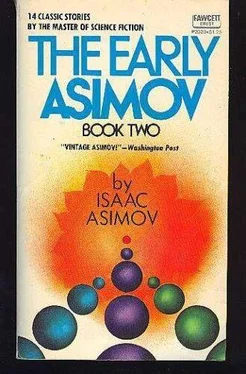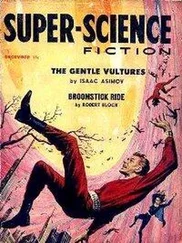Isaac Asimov - The Early Asimov. Volume 2
Здесь есть возможность читать онлайн «Isaac Asimov - The Early Asimov. Volume 2» весь текст электронной книги совершенно бесплатно (целиком полную версию без сокращений). В некоторых случаях можно слушать аудио, скачать через торрент в формате fb2 и присутствует краткое содержание. Год выпуска: 1986, ISBN: 1986, Издательство: Del Rey, Жанр: Фантастика и фэнтези, на английском языке. Описание произведения, (предисловие) а так же отзывы посетителей доступны на портале библиотеки ЛибКат.
- Название:The Early Asimov. Volume 2
- Автор:
- Издательство:Del Rey
- Жанр:
- Год:1986
- ISBN:ISBN: 034-532589-3
- Рейтинг книги:5 / 5. Голосов: 1
-
Избранное:Добавить в избранное
- Отзывы:
-
Ваша оценка:
- 100
- 1
- 2
- 3
- 4
- 5
The Early Asimov. Volume 2: краткое содержание, описание и аннотация
Предлагаем к чтению аннотацию, описание, краткое содержание или предисловие (зависит от того, что написал сам автор книги «The Early Asimov. Volume 2»). Если вы не нашли необходимую информацию о книге — напишите в комментариях, мы постараемся отыскать её.
The Early Asimov. Volume 2 — читать онлайн бесплатно полную книгу (весь текст) целиком
Ниже представлен текст книги, разбитый по страницам. Система сохранения места последней прочитанной страницы, позволяет с удобством читать онлайн бесплатно книгу «The Early Asimov. Volume 2», без необходимости каждый раз заново искать на чём Вы остановились. Поставьте закладку, и сможете в любой момент перейти на страницу, на которой закончили чтение.
Интервал:
Закладка:
I whacked my gavel, 'Question declared improper!'
'I object,' declared Murfree. 'Hayes missed the point. Nothing is perfectly transparent. Glass of sufficient thickness will stop even cosmic rays. Do you mean to say that blue light would pass through an entire planet, or heat, for instance?'
'Why not?' replied Hayes. 'That perfect transparency does not exist in your experience does not mean it does not exist altogether. There is certainly no scientific law to that effect. This planet was perfectly transparent except for one small region of the spectrum. That's a definite fact of observation.'
My gavel thumped again, 'Explanation declared sufficient. Continue, Hayes.'
His cigar had gone out and he paused to relight. Then, 'In other respects, the planet was normal. It was not quite the size of Saturn - perhaps half way in diameter between it and Neptune. Subsequent experiments showed it to possess mass, though it was hard to find out how much - certainly more than twice Earth's. With mass, it possessed the usual properties of inertia and momentum - but no gravity.'
It was 1.35 now.
Hayes followed my eyes and said, 'Yes, only three-quarters of an hour is left. I'll hurry!… Naturally, this queer planet set me to thinking, and that, together with the fact that I had already been evolving certain theories concerning cosmic rays and novae, led to an interesting solution.'
He drew a deep breath, 'Imagine - if you can - our cosmos as a cloud of - well, super-atoms which -'
'I beg your pardon,' exclaimed Sebastian, rising to his feet, 'are you intending to base any of your explanation on drawing analogies between stars and atoms, or between solar systems and electronic orbits?'
'Why do you ask?' questioned Hayes, quietly.
'Because if you do, I demand immediate disqualification. The belief that atoms are miniature solar systems is in a class with the Ptolemaic scheme of the universe. The idea has never been accepted by responsible scientists even at the very dawn of the atomic theory.'
I nodded, 'The gentleman is correct. No such analogy will be permitted as part of the explanation.'
'I object,' said Hayes. 'In your school course in elementary physics or chemistry, you will remember that in the study of the properties of gases, it was often pretended, for the sake of illustrating a point, that the gas molecules were tiny billiard balls. Does that mean that gas molecules are billiard balls?'
'No,' admitted Sebastian.
'It only means,' drove on Hayes, 'that gas molecules act similarly to billiard balls in some ways. Therefore the actions of one are better visualized by studying the actions of the other. - Well, then, I am only trying to point out a phenomenon in our universe of stars, and for the sake of ease of visualization, I compare it to a similar, and better-known, phenomenon in the world of atoms. That does not mean that stars are magnified atoms.'
I was won over. 'The point is well-taken,' I said, 'You may continue with your explanation, but if it is the judgment of the chair that the analogy becomes a false one, you will be disqualified.'
'Good,' agreed Hayes, 'but we'll pass on to another point for a moment. Do any of you remember the first atomic power plants of a hundred and seventy years ago and how they operated?'
'I believe,' muttered Levin, 'that they used the classical uranium fission method for power. They bombarded uranium with slow neutrons and split it up into masurium, barium, gamma rays and more neutrons, thus establishing a cyclic process.'
'That's right! Well, imagine that the stellar universe acted in ways - mind you, this is a metaphor, and not to be taken literally - like a body composed of uranium atoms, and imagine this stellar universe to be bombarded from without by objects which might act in some ways similar to the way neutrons act on an atomic scale.
'Such a super-neutron, hitting a sun, would cause that sun to explode into radiation and more super-neutrons. In other words, you would have a nova.' He looked around for disagreement.
'What justification have you for that idea?' demanded Levin.
'Two; one logical, and one observational. Logic first. Stars are essentially in matter-energy equilibrium, yet suddenly, with no observable change, either spectral or otherwise, they occasionally explode. An explosion indicates instability, but where? Not within the star, for it had been in equilibrium for millions of years. Not from a point within the universe, for novae occur in even concentration throughout the universe. Hence, by elimination, only from a point outside the universe.
'Secondly, observation. I came across one of these super-neutrons!'
Said Murfree indignantly: 'I suppose you mean that gravi-tationless planet you came across?'
'That's right.'
'Then what makes you think it's a super-neutron? You can't use your theory as proof, because you're using the super-neutron itself to bolster the theory. We're not allowed to argue in circles here.'
'I know that,' declared Hayes, stiffly. 'I'll resort to logic again. The world of atoms possesses a cohesive force in the electro-magnetic charge on electrons and protons. The world of stars possesses a cohesive force in gravity. The two forces are only alike in a very general manner. For instance, there are two kinds of electrical charges, positive and. negative, but only one kind of gravity - and innumerable minor differences. Still, an analogy this far seems to me to be permissible. A neutron on an atomic scale is a mass without the atomic cohesive force - electric charge. A super-neutron on a stellar scale ought to be a mass without the stellar cohesive force - gravity. Therefore, if I find a body without gravity, it seems reasonable to assume it to be a super-neutron.'
'Do you consider that a rigorously scientific proof?' asked Sebastian sarcastically.
'No,' admitted Hayes, 'but it is logical, conflicts with no scientific fact I know of, and works out to form a consistent explanation of novae. That should be enough for our purpose at present.'
Murfree was gazing hard at his fingernails, 'And just where is this super-neutron of yours heading?'
'I see you anticipate,' said Hayes, sombrely. 'It was what I asked myself at the time. At 2.09 Ѕ today it hits the sun square, and eight minutes later, the radiation resulting from the explosion will sweep Earth to oblivion.'
'Why didn't you report all this?' barked Sebastian.
'Where was the use? There was nothing to be done about it. We can't handle astronomical masses. All the power available on Earth would not have sufficed to swerve that great body from its path. There was no escape within the Solar System itself, for Neptune and Pluto will turn gaseous along with the other planets, and interstellar travel is as yet impossible. Since man cannot exist independently in space, he is doomed.
'Why tell of all this? What would result after I had convinced them that the death warrant was signed? Suicides, crime waves, orgies, messiahs, evangelists and everything bad and futile you could think of. And after all, is death by nova so bad? It is instantaneous and clean. At 2.17 you're here. At 2.18 you are a mass of attenuated gas. It is so quick and easy a death, it is almost not death.'
There was a long silence after this. I felt uneasy. There are lies and lies, but this sounded like the real thing. Hayes didn't have that little quirk of the lip or that little gleam in the eye which marks the triumph of putting over a good one. He was deadly, deadly serious. I could see the others felt the same. Levin was gulping at his wine, hand shaking.
Finally, Sebastian coughed loudly, 'How long ago did you discover this super-neutron and where?'
'Fifteen years ago, a billion miles or better from the sun.'
'And all that time it has been approaching the sun?'
Читать дальшеИнтервал:
Закладка:
Похожие книги на «The Early Asimov. Volume 2»
Представляем Вашему вниманию похожие книги на «The Early Asimov. Volume 2» списком для выбора. Мы отобрали схожую по названию и смыслу литературу в надежде предоставить читателям больше вариантов отыскать новые, интересные, ещё непрочитанные произведения.
Обсуждение, отзывы о книге «The Early Asimov. Volume 2» и просто собственные мнения читателей. Оставьте ваши комментарии, напишите, что Вы думаете о произведении, его смысле или главных героях. Укажите что конкретно понравилось, а что нет, и почему Вы так считаете.







